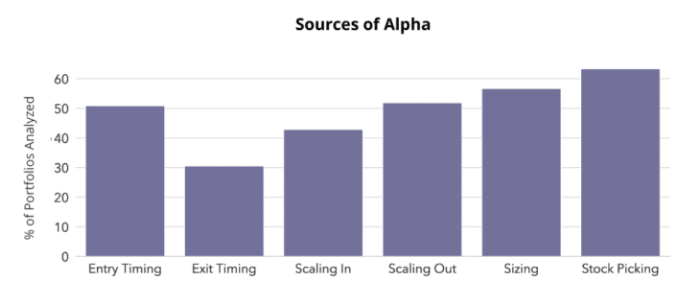

Research by Essentia Analytics, which provides behavioral data analytics and consulting for professional investors, identified how managers could have saved an average of 94 basis points of performance per year by selling stocks earlier.
Clare Flynn Levy, founder and chief executive of Essentia Analytics, told Markets Media: “Firms need to have the right data to determine the factors that create alpha as each portfolio, and each manager, is different. The dataset should include all their deals over at least five years as well as the relevant market data.”
Over three months Essentia’s research team analyzed 60 portfolios over 14 years and tracked 24 ‘categorizers’, ranging from equity sector to holding period to decision day of the week, across six broad investment decision categories, or skills: stock picking, size adjusting, entry timing, exit timing, scaling in and scaling out.
Chris Woodcock, who leads the research and product teams for Essentia Analytics, said in a blog that categorizers are factors that have a significant negative or positive impact on alpha.
Sources of Alpha: Our new research identifies the factors most commonly associated with alpha generation and destruction by equity fund managers. #BehavioralAlphahttps://t.co/gjbsPEQs8h
— Essentia Analytics (@Essentia_AI) June 17, 2020
The research found that across the 60 portfolios, the one factor that significantly affected the generation of alpha was very different.
Flynn Levy said: “I was surprised there was so little consistency in the sources of alpha amongst the portfolios.”
For 63% of managers, alpha was associated with at least one factor within stock picking.
“I was not surprised that stock picking was the most common source of alpha,” she added. “We found most value was destroyed by holding onto losing positions too long and exiting into falling prices.”
Essentia’s system identified when managers should have made an earlier decision and saved an average of 94 basis points of performance per year.
“There is a similarity to people who go to a party,” added Flynn Levy. “Some regret staying until the bitter end, some leave too early and miss the fun but guests should find somewhere in the middle.”
Woodcock said that Essentia’s expectation for carrying out the research was that they would find a small number of “alpha leaks” – which did not turn out to be the case.
“But we were able to identify sources of alpha generation and/or destruction in all portfolios — within a set of factors that are consistent, identifiable and measurable in every case,” he added. “We think these are incredibly encouraging findings for active managers; once identified in their own portfolio, these can be corrected and optimized, with potentially significant benefits to their returns.”
Behavioural analytics
Flynn Levy founded Essentia Analytics in 2013 after spending a decade as a fund manager. Her previous experience included running more than $1bn of pension funds for Deutsche Asset Management and as founder and chief executive officer of Avocet Capital Management, a specialist technology hedge fund manager.
She wanted data that could tell her what she should be doing differently to improve her performance as a fund manager but that was not easy to find.
Essentia uses data to analyse performance and managers receive custom notifications to remind them of their investment process just when their most detrimental behavioural patterns come to the fore.
An @essentia_ai client just told us he estimates that his work with us over the last 6 months has added 100-200bps of alpha YTD. For real. This is why I love my job!
— Clare Flynn Levy (@cflynnlevy) May 20, 2020
“Incoming chief executive officers have a difficult job as there is a limit to how far they can cut costs,” added Flynn Levy. “There is a cultural acceptance that behavioural analytics is a ‘must have’.”








